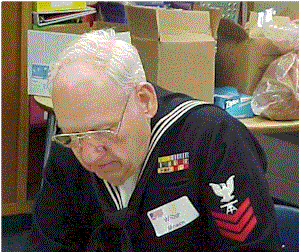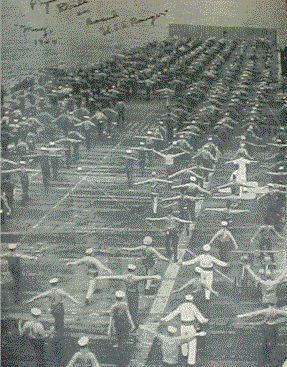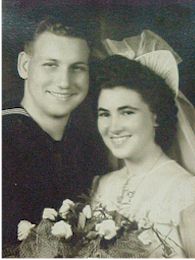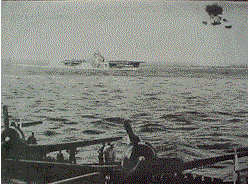CREW'S STORIES
RETURN TO:
Wilbur Mowen
U.S. Navy

 |
Interviewed By: Matt Arnold |
![]()
| I was 17 years old and in high school when I
enlisted in the service. One day a friend and I decided we had had enough
of being in school so we went back to the school, put our books down and
left to join the service. This was in January 1941, nearly a year before
Pearl Harbor.
Training was rough. We went to boot camp in Norfolk,
Virginia. The old chief thought of all kinds of hardships to make our life
rough and to make men out of us. I liked it. We did a lot of marching from
8 to 11 in the morning and again from 1:00 to 3:30. It was cold and we had
to stand watch for 4 hours in our heavy peacoats with a rifle. A typical
day in the Navy after we left training consisted of reveille, then
breakfast. Since I was aboard I found out that this was the person that maintained the gun batteries. I was a range-finder operator. It was like a telescope. I would pick up an enemy airplane and would put a diamond over the enemy plane and the computer in the lower level of the ship would send a missile to shoot the plane down. I was on a neutrality patrol between Norfolk and Trinidad before the war broke out. We were cruising up and down the ocean with all the lights on. We looked like a cruise ship! After the Japanese hit Pearl Harbor every light on the ship was put out. You could not make any light, even to use a cigarette lighter. Our job was to look for German U-boats. During this time a German captain, Lieut. Otto von Bulow, sunk what we called a "jeep" boat. It was a small boat but the German captain radioed back to Hitler that he had sunk the U.S.S. Ranger. The U.S.S. Ranger, of course, had not been sunk. Because of this she was nicknamed "The Ghost Ship" and went on to sink 40,000 tons of German shipping during a raid in Norway.
While in the Pacific I was stationed on board the USS Bennington. There were 5,000 men on board. Our ship carried 90 airplanes. They main airplane was the F4U Corsair and it was a very fast plane. A big cable stretched across the deck and caught a hook on the back of the plane when they came in to land. Sometimes, if they didnít hit their mark and the plane would go into the ocean. We got into a typhoon off the Sea of Japan and the storm bent our bow beneath the flight deck. We went into Leyte Gulf and cut off part of the flight deck. We finished off the war with a shortened deck. Over the years, this ship was recommisioned (put back into service) three times. The Japanese planes that we were dodging were called
Kamikazes. These were When the war was over we were given $100 and sent home. I returned to Washington D.C. and was discharged. I worked odd jobs for a while and took advantage of the "52-20" club. It was called that because the military would pay you $20 a week for 52 weeks to help you get back on your feet. After several attempts to find good jobs I told my wife that I was going to California in my van. I made it as far as Kansas City, and stopped at the Church of the Nazarene's publishing house. And 29 years later I retired from this job at the Church's publishing house as a maintenance electrician. It is my hope and prayer that everyone of us does their part to make sure that war does not happen again. Permission Granted for Use by Wilbur Mowen ©
2001 |
![]()
Thanks for visiting! Do you have any questions?
Comments?
E-mail us nbosch@aol.com, web
editor
Last update 05/03/01 08:52 PM
Copyright © 2001
Nieman Enhanced Learning Center
Wilbur Mowen would be honored to have to have his story
connected to the Bennington site.
Nancy Bosch
Gifted Facilitator
Nieman Enhanced Learning Center
Shawnee Mission, Kansas 66203
http://connections.smsd.org/nieman/el
http://connections.smsd.org/specialeducation
RETURN TO:
 an aircraft carrier, U.S.S. Ranger, next we scrubbed
the decks with a broom that had a hole in the handle filled with sand.
After we'd scrubbed the decks clean we rinsed them with salt water.
The salt water would bleach the decks and they looked like new each day.
Next, we painted whatever parts of the ship needed to be painted. They put
out a shipís newspaper with want ads advertising the jobs that had
vacancies. After about a year of cleaning decks and painting I was tired
of that and saw an ad for a striker to be a fire control man. I had no
idea what I was signing up for but I wanted out of the deck crew, so I
signed up.
an aircraft carrier, U.S.S. Ranger, next we scrubbed
the decks with a broom that had a hole in the handle filled with sand.
After we'd scrubbed the decks clean we rinsed them with salt water.
The salt water would bleach the decks and they looked like new each day.
Next, we painted whatever parts of the ship needed to be painted. They put
out a shipís newspaper with want ads advertising the jobs that had
vacancies. After about a year of cleaning decks and painting I was tired
of that and saw an ad for a striker to be a fire control man. I had no
idea what I was signing up for but I wanted out of the deck crew, so I
signed up.  My wife and I met while I was on leave. I had
been serving in the Atlantic and was on my way to the Pacific when we met.
I went on leave with her brother. We met at a church social. We were
married six months later. The only correspondence that I received between
January and May of 1945 was a telegram announcing the birth of our
baby girl.
My wife and I met while I was on leave. I had
been serving in the Atlantic and was on my way to the Pacific when we met.
I went on leave with her brother. We met at a church social. We were
married six months later. The only correspondence that I received between
January and May of 1945 was a telegram announcing the birth of our
baby girl.  planes loaded
with explosives which would try to crash into American ships. Those
boys did not know how to fly. They were taught how to take off and told
not to come back. They sacrificed their lives for the Emperor.
planes loaded
with explosives which would try to crash into American ships. Those
boys did not know how to fly. They were taught how to take off and told
not to come back. They sacrificed their lives for the Emperor.